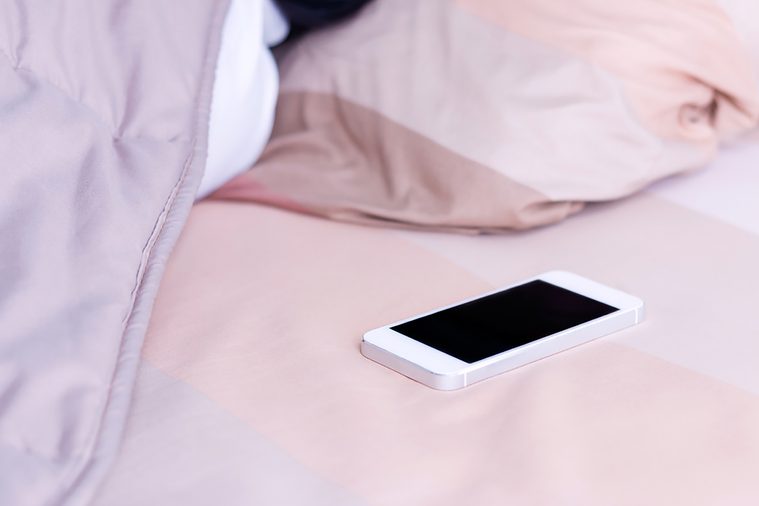Why You Shouldn’t Sleep with Your Phone in Your Bed
Updated: Feb. 26, 2021
Experts are warning you to power down before bed—and here’s why.

Like the rest of the 95 percent of Americans who own smartphones, your phone probably acts as a direct extension of your arm. You check it at work and school, while you eat lunch, and even when you are stuck in traffic—and that’s just one of the signs you’re addicted to your phone.
But according to several health officials, our cell phones could be doing more damage than simply keeping us awake at night. Turns out, the radio frequencies they emit when they’re sending and receiving signals might take a serious toll on our health.
Both the National Cancer Institute and the American Cancer Society have addressed the subject recently. It was important for both of them to note that given how relatively new cell phones are to the general public, long term effects of the radiation given off by our favorite handheld devices won’t be available for a long time. However, several studies have been done both in labs and by interviewing cancer patients about their history with cell phone usage.
Here’s the good news: Radiofrequency (RF) waves given off by cell phones do not generate enough energy to cause the type of DNA damage which would cause cancer.
And then the bad news: Several studies still suggest that the radiation given off by cell phones can help existing tumors grow, and has been proven to cause changes to the human brain—though the effects of those changes have not been articulated. Studies also link exposure to cell phones to skin cancer, testicular cancer, low sperm count, and impaired memory and hearing.
This could be a problem for a lot of people. According to eMarketer, Americans spend an average of three hours and 35 minutes actively on their phones each day. In addition, the National Sleep Foundation reported that 72 percent of all children and 89 percent of teens have at least one mobile device in their sleep environment, and the Bank of America Mobility Report said that 34 percent of younger Millennials (ages 18-24) sleep with their phones on their beds.
Charging your phone in bed is a public health concern all on its own, but given the startling number of people exposing themselves to something we still don’t know the effects of while they are asleep, several experts have been warning the public about the potential for danger.
“Currently, we’re not doing a good job in regulating radiation from these devices. In fact, we’re doing an abysmal job,” Dr. Joel Moskowitz, a professor at UC Berkeley’s School of Public Health and an expert on cell phone radiation, told CBS San Francisco.
This concern led the California Department of Public Health to issue its first guidelines for cell phone usage. In their statement, they advise people to take steps to reduce their exposure to the radiation, such as removing earbuds when you’re not using them and placing the phone away from your bed at night.
But that’s not the only phone-related health risk you should be worried about. The screen has a lot more germs on it than you may realize, too.
